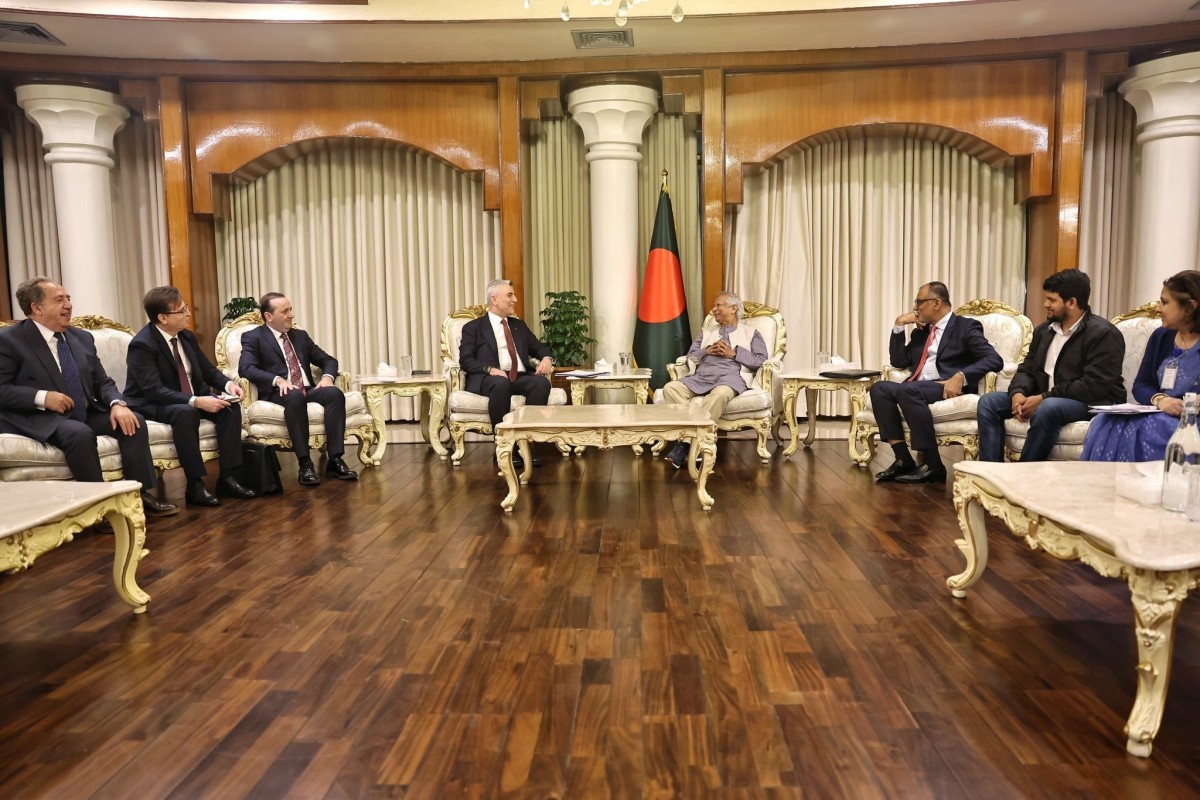As bilateral ties between Bangladesh and India have hit a historic low, Dhaka is now looking to collaborate with Turkey for investment and technology to strengthen its domestic defense industry.
Bangladesh’s Chief Adviser Muhammad Yunus, currently heading an interim government after the ousting of long-time Prime Minister Sheikh Hasina, met with a Turkish delegation led by Trade Minister Dr. Ömer Bolat on January 9 at the state guest house Jamuna in Dhaka.
Yunus, highlighting Bangladesh as the eighth most populous country in the world, said that his government was actively working to create job opportunities for the nation’s youth.
He asked Turkey to invest in the country and suggested that they could utilize Bangladesh’s young workforce to run factories, which would help them to supply products across the region.
During the discussions, Yunus urged Turkey to bring its advanced technology to Bangladesh to help develop the nation’s defense industry.
Chief Adviser said, “You are the leader of the technology; you can build your defense industry here. Let’s make a beginning … we are available for anything that you need.”
Turkish Trade Minister Dr. Ömer Bolat also noted that the two countries could diversify their cooperation beyond the textile industry, which currently constitutes Türkiye’s primary import from Bangladesh.
In addition to the defense industry, Bolat also highlighted healthcare, pharmaceuticals, and farm machinery as key areas for economic cooperation between Bangladesh and Turkey.

In the fiscal year 2023-24, Bangladesh exported goods worth approximately US$581 million to Turkey, while its imports from the country were valued at around US$424 million.
The Turkish Trade Minister proposed that Ankara could take over the role of India and other nations in Bangladesh’s import markets.
“We can replace India and other markets in Bangladesh’s imports. There can be cooperation in economic and social fields at all levels,” the Turkish Minister said.
Currently, around 20 major Turkish companies are active in Bangladesh across various sectors, including garments and textiles, accessories, chemicals, engineering, construction, and energy.
The Turkish companies operating in Bangladesh include AYGAZ, a Turkish LPG company, Coca-Cola Içecek, and ARCILIK, a refrigerator and air conditioner manufacturer that has also acquired Singer Bangladesh Ltd.
Turkey-Bangladesh Growing Relationship
The recent developments come just days after the Pakistani Army signed a historic agreement with Bangladesh to train its military, the first such arrangement since 1971.
This training, set to begin in February 2025, represents a major moment in the history of both countries, as it is the first time since Bangladesh’s independence that it will host Pakistani military forces on its soil—a scenario earlier unimaginable by many Bangladeshis.
The accord was preceded by a meeting between Pakistani Prime Minister Shehbaz Sharif and Bangladesh’s Chief Adviser Yunus in December 2024 on the sidelines of a conference in Cairo.
During the meeting, both leaders agreed to strengthen bilateral ties in all areas of mutual interest, signaling a new chapter in their relationship.
Meanwhile, on January 5, 2025, Bangladesh made a notable diplomatic move by canceling a scheduled visit by its judicial officials to India, a gesture that reflects the growing strain in relations with New Delhi.
With Turkey becoming involved, a potential strategic nexus of Bangladesh, Pakistan, and Turkey is emerging—an alliance that could counterbalance India’s influence in the region.
These moves appear to be part of a deliberate strategy by Dhaka to lessen its dependency on India and diversify its foreign relationships.
Turkey’s increasing influence in Bangladesh’s defense sector is likely to be seamless, as the country is already one of the major suppliers of military equipment to Bangladesh.
Reports have surfaced recently about ongoing negotiations between Bangladesh and Turkish defense manufacturer Otokar Otomotiv ve Savunma Sanayi A.S. to acquire 26 Tulpar light tanks.
According to the manufacturer, the Tulpar is a versatile platform with high lethality, modularity, and future growth potential, designed to meet both current and future operational needs.
Bangladeshi military analysts hold Turkish-made weapons in high regard for their reliability, modernity, and affordability.
Since the mid-2010s, Bangladesh has imported at least 15 different types of military equipment from Turkey. This positions the country as the fourth-largest market for Turkish military goods.
Among the equipment in use by the Bangladesh Army are Otokar Kobra II infantry mobility vehicles (IMVs), mine-resistant ambush-protected (MRAP) vehicles, Otokar Kobra I light armored fighting vehicles (AFVs), RN-94 armored ambulances, TRG-300 Tiger MLRS, and TRG-230 surface-to-surface missiles (SSMs).
However, the crown jewel of Turkey’s defense exports to Bangladesh is the Bayraktar TB2 drone. A TB-2 drone recently drew attention when it was spotted near the border of the Indian state of Meghalaya.
At the time, the sighting of the Bayraktar TB2 drones raised concerns among defense experts in India, with some urging the government to take decisive action. There were calls for stricter measures, including the potential option to shoot down Turkish-made drones if they were spotted near Indian borders again.
The Bayraktar TB2 UCAVs have proven their worth in numerous conflicts, including in Ukraine, Syria, Nagorno-Karabakh, Ethiopia, Burkina Faso, and Mali.
In addition to expanding its arsenal of Turkish-made weapons, Dhaka is also exploring the procurement of a modern fighter jet, with two prominent contenders: the French Rafale and the Eurofighter Typhoon.
A Bangladeshi official previously told EurAsian Times that, given the Indian Air Force’s operation of Rafales, the Eurofighter Typhoon now seems to be the more likely choice for Bangladesh’s future air defense needs.
- Contact the author at ashishmichel(at)gmail.com
- Follow EurAsian Times on Google News